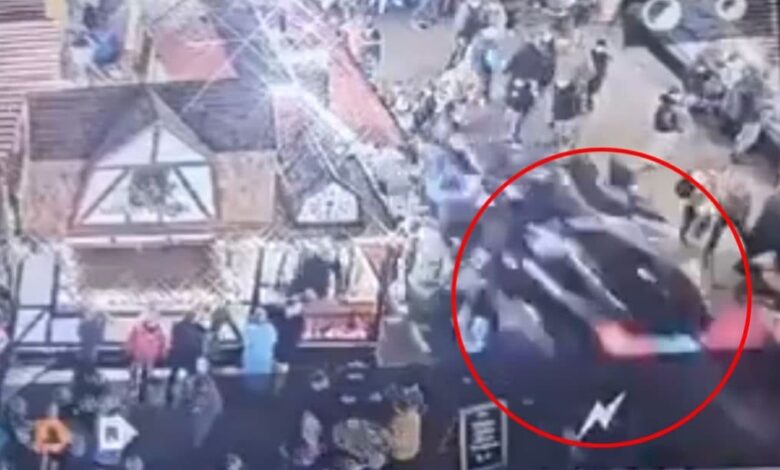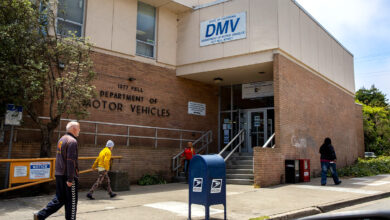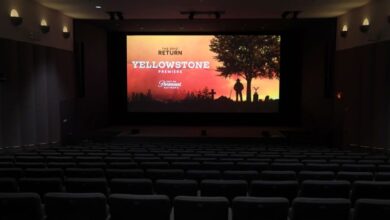Christmas market becomes scene of horror after fatal gap left in security bollards

At just after 7pm on Friday, a black BMW turned off a main road in the east German city of Magdeburg and headed towards the Christmas market.
Driving slowly at first, the car turned onto an alleyway where hundreds of locals were browsing the stalls and sipping hot glühwein. Pointing his vehicle directly at the crowd, the driver slammed his foot on the accelerator.
In footage captured by a nearby camera, the next seconds show scenes of utter horror – the almost 2-tonne car ploughing at full speed through families who barely had time to turn their heads.
As shoppers fled in panic, the driver – named on Saturday as Saudi citizen Taleb al Abdulmohsen – turned another corner and drove out of the market.
An off-duty policeman pursued the vehicle until he came to a halt outside Magdeburg shopping centre, where he was arrested at gunpoint by armed officers.
A still from a video shows a German police officer confronting the alleged Magdeburg attacker
Though it was over in just three minutes, the impact of the attack was devastating: at least five people were killed and some 200 injured, including 40 who were in critical condition.
At the scene of Friday’s attack, police riot vans blocked the Old Market alleyway which had granted the killer a path to his victims.
While most of the perimeter surrounding the Old Market was lined with brick-shaped bollards – placed precisely to avoid tragedies such as this – there were none to be seen at this entrance.
On Saturday, the authorities said the fatal gap had been left to grant access to ambulance and emergency vehicles.

As the glum winter sun rose over the market’s ravaged stalls, upturned chairs, discarded clothes and pools of blood, the people of Magdeburg gathered to mourn their dead.
“We saw it on TV last night and came straight here this morning,” Manfred, a 60-year-old resident, said as he stood next to the Old Market alleyway, wearing a bright blue Magdeburg FC bobble hat.
“It is terrible. It is a very shocking thing for Magdeburg. We’ve never seen anything like this before,” he said. “This will definitely affect the elections [in February]… what is clear is that on security, something needs to change in Germany.”

Emergency crew and doctors rush the injured away from the scene – Craig Stennett

Firefighters take a moment to catch their breath amid the carnage – Ebrahim Noroozi
“This is our hometown, this attack has struck us right in the heart,” said Greta, 65, a retired historian as she quietly sobbed beside the Old Market entrance. “It was a form of pure hatred to do this, and we must confront that hatred.”
She said that Magdeburg, a city in Germany’s former Communist east which lies about 100 miles from Berlin, had changed “significantly” over the past eight years due to mass migration.
“It has been too much and too fast, I would have preferred it if it had been done in a more regulated way and with more planning,” she said. “I fear that we have lost our cultural identity in Magdeburg, we are lacking in a collective belief system, a collective language, a collective set of values.”

Forensics work on a damaged car, believed to be the one used in the attack – Hendrik Schmidt

Police stand guard at the entrance of the market – FILIP SINGER/EPA-EFE/Shutterstock
The attack took place opposite a shopping centre where, just twelve hours ago, a row of electronic billboards were beaming out adverts to Christmas shoppers. On Saturday morning, they had been replaced with a sombre banner: “We mourn the victims. Magdeburg is strong.”
After an hour, policemen guarding the entrance to the Old Market began to disperse mourners and reporters. A rumour that Olaf Scholz, the German chancellor, was about to arrive on the scene rippled through the crowd.
“Germany for the Germans – get the foreigners out,” one man muttered as police moved him on, alluding to the attacker being a Saudi citizen who migrated to Germany in 2006.
When Mr Scholz did arrive, in a convoy of black saloon vehicles, security was lax, with The Telegraph able to approach the chancellor’s car and peer through his window.

A sombre Olaf Sholz visits the scene of the attack in the Old Market – RONNY HARTMANN
On the other side of the tinted glass, the chancellor of Germany was slumped in his seat with his eyes downcast. In that unguarded moment, perhaps unaware he could be seen by mourners on the streets, he appeared vulnerable and weary.
As he clambered out of the car, he was escorted by bodyguards and local officials through the alleyway to inspect the scenes of carnage still on view within the Old Market.
“What a terrible act this was, to injure and kill so many people with such brutality,” Mr Scholz said. “We have now learnt that over 200 people have been injured… almost 40 are so seriously injured that we must be very worried about them.”
Mr Scholz added: “[It is important] that we stay together as a country, that we stick together, and that we link arms, that hatred does not determine our coexistence.”
He then proceeded from the Old Market towards nearby St John’s Church, looking on as Magdeburg’s residents laid flowers, cuddly toys and messages of sympathy on the steps. Some mourners shook hands with paramedics who had also come to pay their respects after working through the night.

A sea of floral tributes near the scene of the attack as locals pay their respects to the dead and injured – Christian Mang
“Magdeburg is such a quiet city, it is completely shocking that something like this could happen here,” Max, 26, said as he watched the gathering crowds. “There is a sense of solidarity here today but we also need to close the borders, and deal with illegal immigrants. We need protection.”
Midolo, a 23-year-old student of educational sciences, lit a candle outside the 11th-century church and spent a few moments in quiet reflection on the steps. “I didn’t know the victims of those injured but it felt important to show up and show sympathy,” she said.
Referring to the attacker’s nationality, she added: “We are heading in a direction of very serious division in our society. But what is important is not where we come from but what our values are,” she added.
As the day drew on, the riot police officer who had bravely chased after the suspect on foot inside the market gave a grim interview to German media about what he saw in the Old Market. “Nobody prepares you for something like that, we walked over the dead,” he told Spiegel magazine. “There were children there too, maybe three years old.”

A woman takes comfort in her dog as she look at the tributes left for the victims – Christian Mang
It also emerged that German riot police had raided a house belonging to suspect Taleb al Abdulmohsen in a village not far from Magdeburg.
Reiner Haseloff, the prime minister of Saxony-Anhalt state, where the attack occurred, has announced a thorough investigation into the attack.
“We owe this to the victims and the citizens of our country rightly expect this too,” he said. “It is shocking that such a tragedy occurred in a place where families and friends wanted to spend some lovely time together in anticipation of the holidays.”
The state parliament of Saxony-Anhalt said they would hold a special meeting on Monday to try and understand the security failures involved. Security was being tightened at Christmas markets across Germany and in Britain, in response to the attack.

Suspect Taleb al Abdulmohsen praised far-Right politicians in posts online
The mayor of Berlin, which suffered a similar vehicle attack on a Christmas market at Breitscheidplatz in 2016, also paid tribute to the victims.
“What a terrible tragedy. Only one day earlier, we in Berlin remembered the victims of the Islamist terrorist attack on the Christmas market at Breitscheidplatz,” said Kai Wegner.
Back outside St John’s Church, a band of Christian singers, who had driven down to Magdeburg from Berlin that morning in a camper van, performed a rendition of Amazing Grace on the church steps.
“I believe [the attacker] experienced things which filled him with hatred,” one of the band members, Yosur, 33, said. “But we can’t combat hatred with more hatred.”




